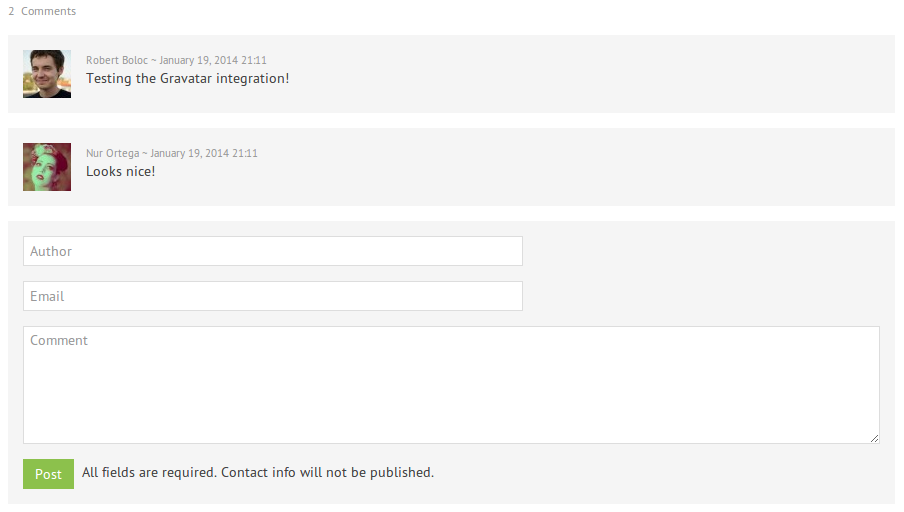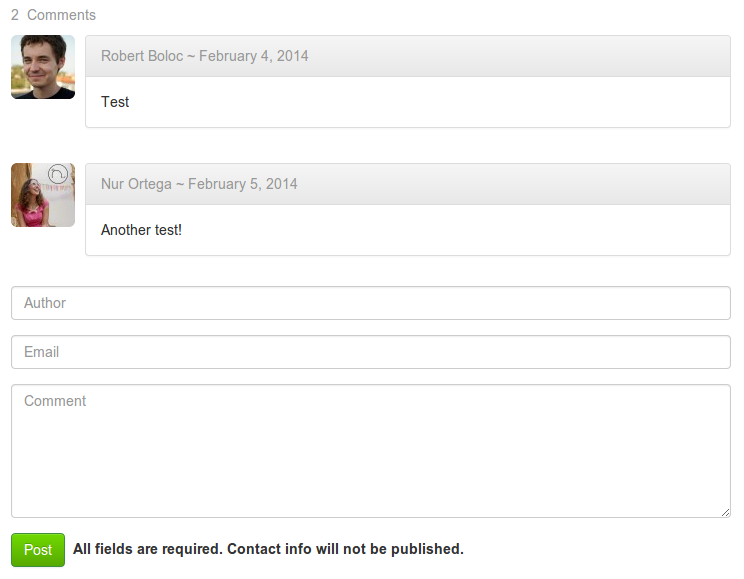robertboloc / rbcomment
Comments for Zend Framework 2 applications
Installs: 317
Dependents: 0
Suggesters: 0
Security: 0
Stars: 15
Watchers: 3
Forks: 2
Type:module
pkg:composer/robertboloc/rbcomment
Requires
- php: ^5.6 || ^7.0
- zendframework/zend-console: ^2.6
- zendframework/zend-db: ^2.8.1
- zendframework/zend-form: ^2.9
- zendframework/zend-http: ^2.5.4
- zendframework/zend-i18n: ^2.7.3
- zendframework/zend-inputfilter: ^2.7.2
- zendframework/zend-loader: ^2.5.1
- zendframework/zend-mail: ^2.7.1
- zendframework/zend-math: ^3.0
- zendframework/zend-mime: ^2.6
- zendframework/zend-modulemanager: ^2.7.2
- zendframework/zend-mvc: ^3.0.1
- zendframework/zend-mvc-plugin-flashmessenger: ^1.0
- zendframework/zend-serializer: ^2.8
- zendframework/zend-servicemanager: ^3.1
- zendframework/zend-stdlib: ^3.0.1
- zendframework/zend-view: ^2.8
- zendframework/zendservice-akismet: 2.0.2
Requires (Dev)
- phpunit/phpunit: ^5.7
- robertboloc/zf2-components-list-generator: dev-master
- squizlabs/php_codesniffer: ^2.7
This package is not auto-updated.
Last update: 2026-02-14 22:16:56 UTC
README
Zend Framework 2 module for drop-in, self-hosted comments, with email notifications, Akismet, ZfcUser and Gravatar integration.
Table of contents
Installation
- Add the module key to your
composer.jsonfile
{
"require": {
"robertboloc/rbcomment": "^2.0"
}
}
-
Run
composer update -
Import the schema from
data/schema.sqlinto your database. -
Add the new module to your application's modules list in
config/application.config.php
'modules' => array( 'Application', 'RbComment', // Add this ),
Usage
In your views use the rbComment helper to display the count, the list and a form for adding new comments. Invoke it
where you want your comments box to appear. Simple isn't it? This helper can be used in any view.
<?php echo $this->rbComment($theme) ?>
The $theme parameter is used to specify the theme of the comments box (if none is specified default is used).
Currently, the module is designed to allow only one comment box per page, as it uses the page uri to identify a thread.
Themes
The module comes with 2 themes for now. To implement new ones create a new partial using as base the existing ones.
Use your new theme calling $this->rbComment('yourpartial')
The current themes (and possible values of the $theme parameter if not using a custom partial) are :
default
Basic theme with no external dependencies. Contains the minimum styling to make it look decent.
<?php echo $this->rbComment() ?>
uikit
This theme requires the UIkit CSS framework. Use this theme if your project is based on the UIkit framework.
<?php echo $this->rbComment('uikit') ?>
bootstrap3
This theme requires the Bootstrap v3.x.x CSS framework. Use this theme if your project is based on the Bootstrap framework, version 3.
<?php echo $this->rbComment('bootstrap3') ?>
Configuration
The default configuration of the module can be found in the file config/module.config.php.
To override the defaults, add your values under the rb_comment key in the config/autoload/local.php file
of your application, using the same structure as in the defaults.
Currently the configurable parameters are:
default_visibility
This parameter controls the visibility of the newly published comments. If set to 1 all new published comments will be visible. If 0 they will not be shown. This is useful for moderation.
strings
This array contains the translations for the strings used in the comments box. To change or translate to another language override these values with your own.
This array contains email notifications parameters
'email' => array( /** * Send email notifications. */ 'notify' => false, /** * Email addresses where to send the notification. */ 'to' => array(), /** * From header. Usually something like noreply@myserver.com */ 'from' => '', /** * Subject of the notification email. */ 'subject' => 'New Comment', /** * Text of the comment link. */ 'context_link_text' => 'See this comment in context', ),
For sending the emails the module uses a service factory called RbComment\Mailer.
As a default it configures a sendmail transport. This should be changed in
production and customized to your needs (probably with smtp).
To do this rewrite the service factory RbComment\Mailer.
akismet
The module provides integration with the Akismet service. Comments marked as spam will be hidden (not deleted) and no notification will be sent. To use this feature the following params must be configured:
'akismet' => array( /** * If this is true, the comment will be checked for spam. */ 'enabled' => false, /** * Your Akismet api key. */ 'api_key' => '', /** * Akismet uses IP addresses. If you are behind a proxy this SHOULD * be configured to avoid false positives. * Uses the class \Zend\Http\PhpEnvironment\RemoteAddress */ 'proxy' => array( /** * Use proxy addresses or not. */ 'use' => false, /** * List of trusted proxy IP addresses. */ 'trusted' => array( ), /** * HTTP header to introspect for proxies. */ 'header' => 'X-Forwarded-For', ), ),
zfc_user
By default the ZfcUser integration is disabled. To use it you must update this flag in your config file.
'zfc_user' => array( /** * This enables the ZfcUser integration. */ 'enabled' => false, ),
gravatar
By default the Gravatar integration is disabled. To use it you must update this flag in your config file.
'gravatar' => array( /** * This enables the Gravatar integration. */ 'enabled' => false, ),
CLI
The following cli commands are available:
delete spam Delete all comments marked as spam from the database
This can be added to your cron to periodically remove spam from the database and keep your tables clean and light.
Roadmap
If you want to contribute to the development of this module and don't know where to start you can pick one of this tasks :
- Allow multiple instances of the comments box on the same page
- Use AJAX for storing/retrieving comments
- Emoji integration
- Block spammers by IP
- More themes
Notes
-
If you are using the BjyAuthorize module (or any other route restricting module) make sure the route
rbcommentis publicly accessible. -
This module assumes you have a database adapter configured.



